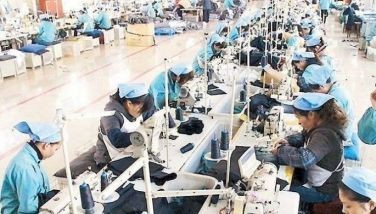Local anti-trust law

Many businessmen in the country laud the filing of House Bill No. 4320 introduced by Rep. Sergio A.F. Apostol of the Second District of Leyte filed on the first regular session of the 16th Congress. The bill is known as the Philippine Fair Competition Act of 2014.
We had Lower House Deputy Speaker Apostol on the show last week and he was expectantly gung-ho about this bill. To quote him: â€The increased deviousness and complexity of schemes in perpetuating monopolies in the free market necessitates an equally sophisticated legislation that would effectively address this concern. Protection against price manipulators is an effective way by which the government can provide people better access to various goods and commodities in the market. By providing an equal playing field in the business sector, consumers will have improved access to affordable, and at the same time quality goods.â€
The proposed bill was received in the House of Representatives only last April 23 and in effect, it penalizes anti-competitive agreements, abuse of dominant position and anti-competitive mergers. The bill also seeks to establish the Philippine Fair Competition Commission and appropriating funds for the body to pursue its mandate.
Monopolies have been the hallmark of Philippine business for generations, such that the leading brands went unchallenged for decades. In beer, San Miguel was synonymous to the beverage, like Colgate was to toothpaste. The brands have so entrenched in our culture that they have taken the form of the generic name that goes with the product. For instance, if one was to buy toothpaste in a sari sari store, he inevitably orders for “Colgateâ€, even if other lesser-known brands are carried, and if the sales lady gives him this other brand instead, the buyer happily walks away. No problem, all he wanted was toothpaste anyway.
Monopolies were supposed to be broken up in the Marcos era, but his authoritarian regime supposedly perpetuated them instead, with his cronies in the forefront. House Bill No. 4320 is actually not a new version but a refinement of an old bill passed and it was largely patterned after a similar bill passed in the United States ages ago. The first one was the Clayton Bill of 1914 which was later amended in 1936 and which still holds now for this super nation of mega business concerns.
With the end in view of preventing the concentration of economic power in a few persons (make that a few families, in the case of the Philippines) who threaten to control the production, trade or industry in order to stifle competition, distort or manipulate or constrict the discipline of free markets, or otherwise increase the prevailing market prices in the country. Well, this is still happening now and, like it or not, this is still the very picture of Philippine business. We are talking here of telecommunication which is basically dominated by three telcos. We are talking here of three major television networks, and this is true as well for cigarettes, beer, soft drinks, ice cream and the biggest of all, power. The entry of smaller players in fuel has augured well for consumers as there is still a game of pricing when it comes to gasoline. But power? We’re still at the mercy of a monopolistic market. Remember that recent incident when several power plants supposedly had to undergo massive rehabilitation because, due to its age, they all suspiciously bogged down at the same time, spiking the price of power in the country. What is the latest on this?
The Philippine Fair Competition Act of 2014 seeks to “penalize all forms of anti-competitive agreements, abuse of dominant position, and anti-competitive mergers, with the objective of protecting consumer welfare and advancing domestic and international trade and economic development.†The agreements referred to here covers even oral or informal/tacit agreements, which I think is a little tricky to oversee. The bill seeks to demolish cartels, and we do have quite a few in this country, admit it. Cartels, for purposes of this act, means the “combination of firms providing goods in relevant markets, acting or joined together to obtain a shared monopoly to control production, sale and price, or to obtain control in any particular industry or commodity, or a group of firms that agree to restrict trade. It shall also refer to firms or section of firms having common interest designed to promote the exchange of knowledge resulting from scientific and technical research, exchange of patent rights and standardization of products among themselves with the intent of preventing, restricting or distorting competition.†Control shall refer to at least 20 percent ownership, whether directly or indirectly of a firm or a group of firms by another firm. As to the term dominant position, I guess there is no need to define this – any company that is positioned to control the market when it comes to the sale of particular goods or services in specific geographical area for their commercial activity falls under this term.
So what are the prohibited acts under this bill? With this act, it becomes unlawful for forms to engage in horizontal (between two or more enterprises operating at the same level in the market) or vertical (between two or more enterprises, each of them operating at a different level of the production or distribution chain and relating to the conditions under which the parties may sell, purchase or resell specific goods or services) agreements. Price fixing among competitors is, likewise, held unlawful as well as bid rigging which, of course, is almost a standard practice when it comes to bidding for government projects. It also targets companies selling goods at below relevant goods if this is intended to drive away competitors, those companies colluding to limit or control production, technical development or investment with the intent of creating cartels; efforts to control sources of raw materials amongst themselves; and agreements prescribing discriminatory pricing terms or conditions in the supply or purchase of goods of same quality.
The bill does not penalize socialized pricing, volume discounts, competitive pricing and bona fide selection of Customers, price differentials due to changing market conditions, exclusivity arrangements, and tie-in arrangements.
More next week, folks.
Mabuhay!!! Be proud to be a Filipino.
For comments (email) businessleisure-star@stv.com.ph/sunshine.television@yahoo.com
- Latest
- Trending



























